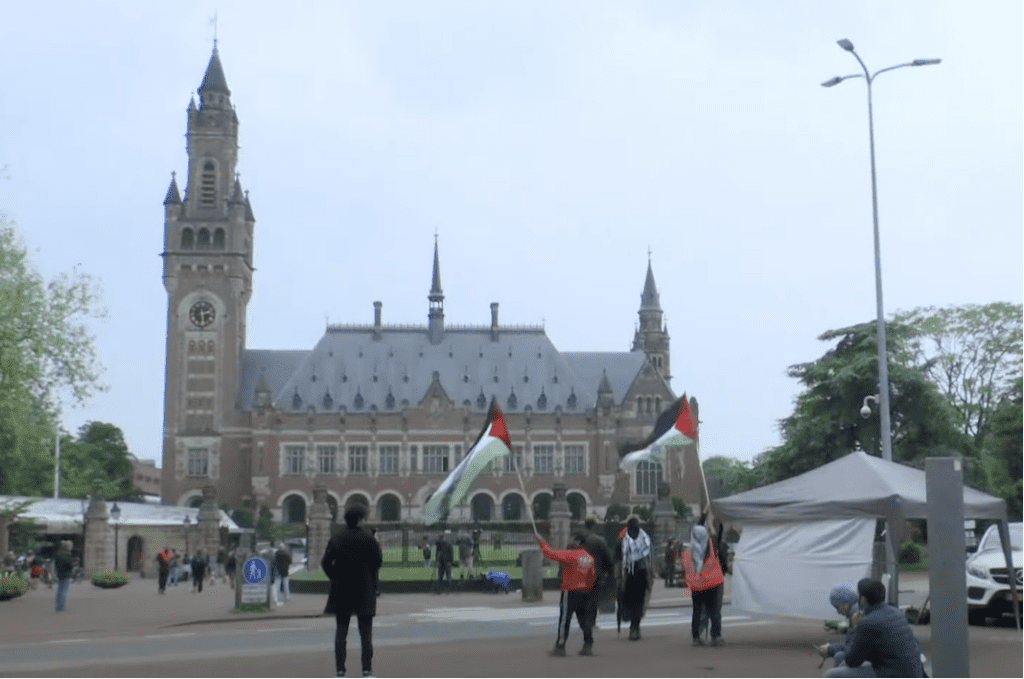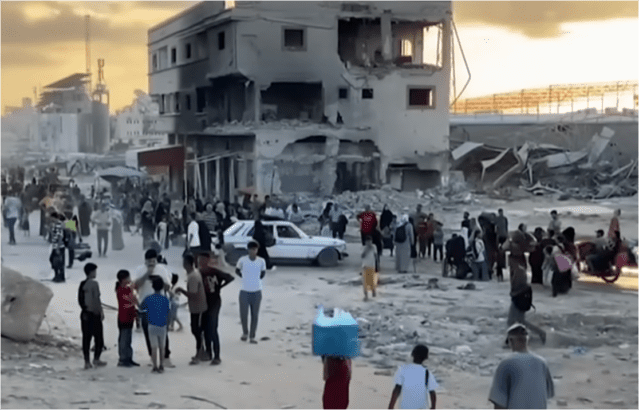Is Israel singled out for rebuke on the world stage? Quite the opposite: it has enjoyed a free ride until the current war with Gaza.
by Dahlia Scheinlin, reposted from Ha’aretz
It is only a slight exaggeration to say that Israelis believe the international system was established primarily for the purpose of hating Israel. Israelis and many Diaspora Jews have long taken for granted that international institutions are biased, that they single out Israel, hold double standards and ignore all other violators of human rights. And then came the Gaza war.
South Africa’s case at the International Court of Justice accusing Israel of genocide was compounded by the International Criminal Court, whose chief prosecutor is seeking arrest warrants against Israeli leaders, right alongside Hamas leaders.
The reactions from Israel have been histrionic: In just one of countless examples, the Israeli Foreign Ministry called the ICC prosecutor’s decision “absurdity incarnate,” a “folly of the highest order” and “morally twisted.” And naturally, “there has never been anything like it.”
The truth is quite the reverse. The decades-old image that Israel alone gets named, blamed and punished for the kinds of things all others do for free is one of the greatest historical fictions in Israel’s history. It would be more accurate to say that for most of its life, Israel has gotten an incredibly free ride in its foreign relations.
Conflict and war can affect a country’s foreign relations extensively, from individual state-to-state relations, to membership status in international meta-state associations, United Nations membership, investigations by UN bodies, accusations in international courts or sanctions in various fields.
Who sins, who is punished?
A quick journey comparing Israel to other countries in conflict is telling. No two countries or conflicts are identical, and this isn’t a controlled experiment. But like an Impressionist painting, when we step back from each granular detail, a fairly clear picture emerges.
First, those who are baffled by any global opprobrium need to recall that Israel does actually violate postwar international norms, as do numerous other countries.
Israel has violated UN General Assembly resolutions, including 181 (the Partition Plan) and 194 (regarding Palestinian refugees) since the earliest years. In 1967, Israel occupied territory in war (not illegal in itself), which it has essentially been annexing in slow motion ever since – and yes, the prohibition against acquiring land by force applies to any territory, not only sovereign states.

Civilian settlements – a clear violation of international law – began almost immediately and never stopped other than in Gaza. Israel openly annexed East Jerusalem and the indisputably sovereign Syrian territory of the Golan Heights, and grabbed West Bank land through the separation wall.
All this has undermined Palestinian rights to self-determination, which has been affirmed numerous times by the UN.
Then came the severe closure policy over Gaza from 2007, separation between Gaza and the West Bank, and the wars in Gaza, all bringing human rights violations, and a vast toll on civilian life and infrastructure.
Now consider other countries involved in serious violations of international law and norms. From the 1990s, the use of sanctions regimes has proliferated, says Nathan Stock, nonresident scholar at the Middle East Institute in Washington. Stock was based in Israel and Palestine for years and has studied the issue closely.
“Since the end of the Cold War, multilateral imposition of economic sanctions on states that are considered to be rogue actors have become very common,” Stock told me. They are even the “default tactic certainly of Western governments, very much including the U.S., for addressing what they perceive to be threats to peace and security.
Most prominently, the UN has imposed sanctions regimes on Yugoslavia and Iraq; the United States has targeted sanctions on Venezuela since 2005; and there have been sweeping multilateral sanctions on Russia over the last decade. Israel has faced nothing at all by way of official, multilateral sanctions regimes. The boycott, divestment and sanctions movement has been a resounding failure [in terms of pressuring Israel to change its policies].
Regarding international associations, Israel has unconstrained access. Shortly after statehood, Israel joined the UN (although not on its first try). It participates in numerous partnerships, including with the Council of Europe and the OSCE, and in 2010, shortly after the first war in Gaza, Israel joined the OECD as one of just 38 members.
Alongside the expansion of the occupation, creeping annexation and accelerating violent escalations over the last 20 years, Prime Minister Benjamin Netanyahu deepened Israel’s alliances in the 2010s, often with undemocratic, authoritarian countries with nationalist populist leaders, and began the new decade with 2020’s Abraham Accords.
By contrast, Russia was kicked out of the Council of Europe due to its war in Ukraine from 2022. The G7 used to be the G8 until the 2014 invasion of Ukraine prompted Russia’s eventual ouster-exit.
But there are worse fates: in 1974, the UN General Assembly literally suspended apartheid South Africa’s participation in the Assembly for the next 20 years, until apartheid ended. Also in 1974, the UN Security Council voted on a resolution to expel South Africa from the international forum entirely. The unprecedented move was vetoed by the Americans, British and French. But many of the supporting countries also had abysmal human rights records, such as Algeria, Soviet Belarus, Cuba, Pakistan and Libya.
Kosovo can’t join the UN at all, though it strains to comply with international law, and faces an ongoing de-recognition campaign from Serbia, sometimes successful.
In the ’60s, South Africa was also kicked out of the Olympics – twice. Much of the pressure to exclude it came from African countries, who presumably were not accused of being anti-African, as any Jewish person who supports a boycott of Israel would be.
In 1993, Yugoslavia was banned from the Eurovision Song Contest for the war in Bosnia, where people were starving and Sarajevo was under siege. The worst crimes – 8,000 civilians killed in Srebrenica, later designated as genocide by an international tribunal – hadn’t even happened yet.
But Israel remains an enthusiastic participant in all Olympic Games as well as Eurovision. Eden Golan, Israel’s Eurovision star this year, was forced by the organizers to remove the “political” connotations of her song; but it was Palestinian colors and symbols that earned a scolding. Palestine of course can’t participate at all.

Going back to the International Criminal Court and International Court of Justice, the accusation of singling out Israel for hypocrisy is just silly. The ICJ, the oldest postwar international court, has seen 195 cases submitted since 1947 – two of them were against Israel.
The ICC has indicted dozens of people since 2002, with more African defendants than others, while powerful Western countries face no accountability. Recently, the court issued warrants to arrest more of Putin’s top accomplices in the war. The current prosecutor, Karim Khan, has so far ignored the preliminary investigations of his predecessor, Fatou Bensouda, regarding the Israeli occupation.
As for Bensouda, one of her early moves was to request an investigation of Britain for allegations of mistreatment of prisoners in Iraq from 2003-2008. The U.K. government did not denounce her as anti-British. Instead, it recognized “the importance of the ICC prosecutor following the proper legal procedures when complaints are made. The U.K. government has been, and remains a strong supporter of the ICC and I will provide the office of the prosecutor with whatever is necessary to demonstrate that British justice is following its proper course,” said Attorney General Dominic Grieve.
UN in the crosshairs:
Nothing inflames the pro-Israel crowd like the UN. I too criticized UN Women’s strange reluctance to address sexual violence on October 7 in the early months. But that was a specific incident. [EDITOR’S NOTE: to understand the issue of alleged sexual violence on October 7th, read this and this and this.]
The UN Watch NGO tracks putative endemic anti-Israelism at the international body – for example, by arguing that there have been more commissions of inquiry against Israel than other countries. Each of the two commissions related to Gaza wars (after operations Cast Lead and Protective Edge, in 2008-2009 and 2014, respectively) has been denounced in Israel as biased, predetermined and hypocritical.
But the UN Human Rights Council – admittedly a problematic body – has also established commissions for Ukraine, Syria, Burundi and Eritrea. There are also fact-finding missions, groups of independent experts, or independent investigative mechanisms for various countries – Sudan, Nicaragua, Myanmar, respectively, and other countries. I doubt Israelis have even browsed these reports; the anti-Israel bias is taken on faith.
The Security Council has issued a great many resolutions regarding Palestine. The slightly erratic UNSC Resolution database (with many technical, not substantive, resolutions), turns up more such resolutions than for other long-running conflicts such as Somalia, Cyprus or Kashmir – though the first two are simply younger conflicts.
But Israel is singled out in the UN – for special protection. According to one analysis, over half of all U.S. vetoes in the Security Council have been cast to protect Israel (45 of 89 up to late 2023). In 2002, the international relations scholar Stephen Zunes found that 91 UNSC resolutions were not being implemented at that time; the top scofflaw was Israel, which ignored one-third of them (31). I counted 18 U.S. vetos from the year 2000 to the present; 15 were about Israel and Palestine.
The U.S. role, of course, is also conspicuous regarding the lack of sanctions. Stock said: “Given how frequently the U.S. has imposed various kinds of economic sanctions or even organized other countries to coordinate on sanctions regimes … since the 1990s, the fact that Israel has avoided anything of that nature is incredibly striking.”
The current war is the first time Israel has confronted more significant international consequences for its actions. Let’s tell the truth: beyond rhetorical wrist slaps, Israel has been a triumph of global integration. Sorry to shock people who make a living peddling the myth, but Israelis need to realize how good they’ve had it – and how much they have to lose.
Dr. Dahlia Scheindlin is a public opinion researcher and a political advisor who has worked on eight national campaigns in Israel and in 15 other countries.
RELATED:
- War on Gaza: Why Israel deserves to be singled out for criticism
- Israel and US deliberately gutting international law in Gaza
- Synopsis of ICJ’s decision on Israeli genocide, reactions, and take-aways
- The World United for Sanctions on Russia. Why Can’t It Do the Same for Palestinians?
- A history of the US blocking UN resolutions against Israel
- War on Gaza: Why ICC bid for arrest warrants is a bold and historic move — Richard Falk





